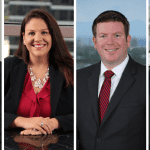This article originally appeared in the Daily Business Review on November 8, 2019 and was written by Raychel Lean.
Celebrated Miami appellate attorney Edward G. Guedes of Weiss Serota Helfman Cole & Bierman cut his teeth with oral arguments before his parents. Now he’s a fellow of the American Academy of Appellate Lawyers.
Decades before Miami appellate attorney Edward G. Guedes was the go-to practitioner for governments and businesses, he quips he was arguing before his Cuban parents.
Guedes tried one of those early cases at a restaurant on a family vacation, when his parents were poised to order food on his behalf.
“I sort of interrupted them and said, ‘I think I should be allowed to pick my food, and this is why,’” Guedes said. “And they looked at me and they said, ‘OK, fine. You want to pick your food? Pick your food.”
Guedes absolutely hated what he picked, but that wasn’t the point: He’d discovered the power of persuasion.
Now a regular at the Florida Supreme Court, Guedes has handled high-stake appeals, serves as chief appellate and trial support counsel for Publix Super Markets Inc., and on Oct. 25 became one of only 500 attorneys in the country to be invited to become a fellow of the exclusive American Academy of Appellate Lawyers.
Guedes began his career as a trial lawyer, but something about it just didn’t appeal to him.
“I think if you asked 100 appellate lawyers what is the primary reason they became appellate lawyers, 98 of them will tell you is reason No. 1, they hate discovery,” Guedes said.
For Guedes, the “juiciest” cases are those like Dalack v. Village of Tequesta, in which he represented a Palm Beach County village facing a lawsuit over its oath of office that threatened to change the way governments operated throughout Florida.
The problem? Voters of Tequesta had elected attorney Basil Dalack as a council member, but he refused to swear or affirm that he’d support, protect and defend the U.S. and Florida constitutions.
“In his mind, he said, ‘Because George W. Bush is the president of the United States and I don’t agree with his policies, I don’t agree with his administration, I cannot swear an oath that I will support, protect and defend his administration,” Guedes said. “He was reading ‘government of the United States’ to mean ‘current president in office and the current administration in office.’”
Dalack couldn’t take public office, so he sued, arguing that under the First Amendment the government couldn’t force him to adopt a position with which he disagreed.
Long bouts of oral arguments in a federal courtroom ensued, while Guedes felt like pinching himself.
“I remember being asked hypothetical questions about what would have happened in revolutionary America if the oath didn’t exist, and I’m thinking, ‘Whoa, this is way beyond what I would have expected,’” Guedes said. “It was one of those cases that when you’re in law school you always think, ‘Wow, that’s the kind of stuff I want to do,’ but then when you get into the real world, you find that you don’t get them.”
U.S. District Judge Donald Middlebrooks ruled in favor of Guedes’ client, finding for Tequesta. He found Dalack had to take the oath of office if he wanted to hold public office.
Dalack appealed to the U.S. Court of Appeals for the Eleventh Circuit, where he lost before a panel of three former military judges. The case reached the U.S. Supreme Court, which declined review.
‘Keep finding ways’
Since 2008, Guedes has sat at the epicenter of all red-light camera litigation in Florida. And it’s been a roller-coaster ride.
The city of Aventura, Guedes’ client, caused the controversy when it became one of the first in the state to experiment with red-light camera programs, and one alleged violator filed a lawsuit.
The case prevailed in trial court, then fell down on appeal. But the Florida Supreme Court ultimately delivered a major blow for Aventura, with a ruling that rendered all red-light camera programs invalid.
In 2010, the Florida Legislature enacted the red-light camera program through the Mark Wandall Traffic Safety Program, a statute named after a man who was killed by a driver running a red light.
The legal challenges came pouring in, until Guedes was left to help fend off a $200 million class action lawsuit against Aventura and 40 other municipal governments.
The plaintiffs alleged that police didn’t have the right to hire outside agencies to help sift through footage of thousands of potential red-light violations. Guedes argued that it wasn’t an unlawful delegation of authority, as police were the sole arbiters on what was a red-light violation and what wasn’t, implementing rules that the vendors had to follow.
After years of litigation all over Florida, Guedes argued before the state Supreme Court, which ruled 7-0 for the city.
“The lesson being, you never stop fighting,” Guedes said. “If you believe in your legal arguments, you keep arguing and you keep finding ways, ethically and responsibly, of pursuing your client’s interest.”
‘Always ahead of me’
Weiss Serota Helfman Cole & Bierman partner Joseph Serota met Guedes as a rookie associate, and said his ability to weave powerful themes in his writing and arguments, even then, were the legal equivalent of artwork.
“When he was 23, he did a legal memo for me that was so creative and came up with so many unique points that I needed,” Serota said.
If Guedes isn’t taking the lead, he’s in the background pulling case law at 100 miles an hour, according to Serota. He recalled how Guedes helped land a defense verdict for Miami Beach seafood restaurant Joe’s Stone Crab, hit with a lawsuit alleging breach of contract and fiduciary duty.
“At any moment in the middle of the case when I would need help, I would literally reach behind me and he would be finding cases,” Serota said. “He was always ahead of me.”
Board certified in appellate practice and a graduate of Harvard University and Amherst College, Guedes is widely known as a superstar student, but it’s not his only talent.
A knack for academics wasn’t the only thing Guedes discovered at college. As an 18-year-old freshman, Guedes decided to audition for Amherst’s choral society “on a lark,” after watching a concert performance, and he’s been part of singing groups ever since.
With the school’s glee club, Guedes took part in a world tour, performing for major figures such as Prince Rainier III of Monaco and the president of Taiwan.
Every Sunday, Guedes sings with a choir at Miami Beach’s St. Patrick Catholic Church.
“I can go on the record and say that we’re actually really good,” Guedes said. “For all the analytical, cold detachment that the law sometimes brings, music and singing is my outlet.”
Guedes’ vacation time is devoted to husband and partner of 25 years Ric Ryan, a flight attendant with whom he shares an obsession with travel. “He’s my partner in crime, my co-world traveler. He is it,” Guedes said.
Edward G. Guedes
Born: October 1963, Coral Gables
Spouse: Ric M. Ryan
Education: Harvard Law School, 1988; Amherst College, B.A., 1985
Experience: Member, Weiss Serota Helfman Cole & Bierman, 2009-present; Shareholder, Greenberg Traurig, 2005-2009; Member, Weiss Serota Helfman Cole & Bierman, 1992-2005; Associate, Coffey Aragon Martin & Burlington, 1990-1992; Associate, Fine Jacobson Schwartz Nash Block & England, 1988-1990.




